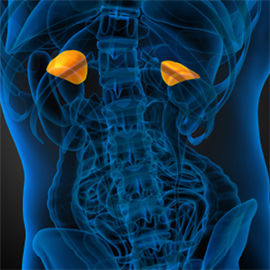Finding by international, NIH researchers may provide basis for new treatments, diagnostic test

The gene responsible for food-triggered Cushing syndrome has been identified by an international team that includes researchers from the Eunice Kennedy Shriver National Institute of Child Health and Human Development (NICHD), part of the National Institutes of Health. The finding raises the possibility that a test could be developed to help diagnose this uncommon form of Cushing syndrome early, before health complications become serious.
Cushing syndrome is a rare disorder caused by overproduction of the stress hormone cortisol. It can result in obesity, fatigue, bone loss, high blood pressure, and diabetes. Findings from the current study, which appears online in JCI Insight, may also provide the basis for a treatment to block the release of excess cortisol releases after eating.
Background
There are many potential sources of excess cortisol in Cushing syndrome, among them certain medications and tumors in the brain or adrenal glands. Discovered in the early 1990s, food-dependent Cushing syndrome occurs when specialized cell surface molecules, or receptors, form on the adrenal glands. These receptors serve as docking sites for glucose-dependent insulinotropic polypeptide (GIP), a hormone that stimulates insulin release after eating. Ordinarily, GIP receptors are found only in the pancreas and the intestines.
In food-dependent Cushing syndrome, the released GIP binds to the adrenal receptors, stimulating the glands to produce cortisol.
Results
A team of researchers from France, Belgium, Canada, the Netherlands, and NICHD analyzed adrenal tissue from 14 patients with food-dependent Cushing syndrome. They found that the patients had GIP receptors on their adrenal glands. However, the receptors were found only on tumors appearing on the adrenal glands, not in healthy adrenal tissue. Within these tumors, the gene for the GIP receptor was activated, directing the formation of receptors on the tumors’ surface.
Significance
“Previously, food-dependent Cushing syndrome was diagnosed by excluding other conditions,” said Constantine Stratakis, M.D., NICHD Scientific Director and one of the authors of the study. “We have established that the condition has a genetic cause, a finding that could advance development of a diagnostic test that enables earlier identification and treatment.”
Next Steps
Dr. Stratakis said that a future test for food-dependent Cushing syndrome might isolate proteins or genetic material associated with the adrenal GIP receptors. Similarly, researchers might also seek to develop drugs that block GIP from binding with adrenal receptors or prevent activation of the GIP gene in adrenal tissue.
Reference
Lecoq AL, et al. Adrenal GIPR expression and chromosome 19q13 microduplications in GIP-dependent Cushing’s syndrome. JCI insight. 2017; 10.1172/jci.insight.92184.

 BACK TO TOP
BACK TO TOP